Ditapis dengan

Framing global mathematics
This open access book is about the shaping of international relations in mathematics over the last two hundred years. It focusses on institutions and organizations that were created to frame the international dimension of mathematical research. Today, striking evidence of globalized mathematics is provided by countless international meetings and the worldwide repository ArXiv. The text follows …
- Edisi
- -
- ISBN/ISSN
- 9783030956837
- Deskripsi Fisik
- xx, 384p., il.
- Judul Seri
- -
- No. Panggil
- 372.7 NOR f

Teaching Tolerance in a globalized world
- Edisi
- -
- ISBN/ISSN
- 9783319786926
- Deskripsi Fisik
- -
- Judul Seri
- -
- No. Panggil
- 372 HER t
- Edisi
- -
- ISBN/ISSN
- 9783319786926
- Deskripsi Fisik
- -
- Judul Seri
- -
- No. Panggil
- 372 HER t
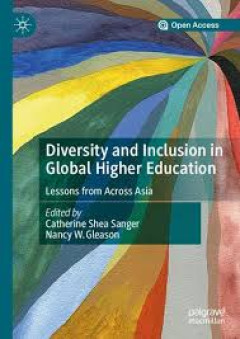
Diversity and Inclusion in Global Higher Education Lessons from Across Asia
- Edisi
- -
- ISBN/ISSN
- 9789811516283
- Deskripsi Fisik
- -
- Judul Seri
- -
- No. Panggil
- 378.008 SAN d
- Edisi
- -
- ISBN/ISSN
- 9789811516283
- Deskripsi Fisik
- -
- Judul Seri
- -
- No. Panggil
- 378.008 SAN d

Shadow libraries :access to educational materials in global higher education
How students get the materials they need as opportunities for higher education expand but funding shrinks.From the top down, Shadow Libraries explores the institutions that shape the provision of educational materials, from the formal sector of universities and publishers to the broadly informal ones organized by faculty, copy shops, student unions, and students themselves. It looks at the hist…
- Edisi
- -
- ISBN/ISSN
- 9780262535014
- Deskripsi Fisik
- -
- Judul Seri
- -
- No. Panggil
- 070.5 SHA s
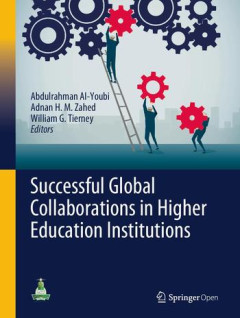
Successful global collaborations in higher education institutions
This open access book presents deep investigation to the manifold topics pertaining to global university collaboration. It outlines the strategies King Abdulaziz University has employed to rise in global rankings, and the reasons chosen to collaborate with other academic and research institutes. The environment in which universities currently exist is considered, and subsequently how an innovat…
- Edisi
- -
- ISBN/ISSN
- 9783030255251
- Deskripsi Fisik
- xvii, 93p. : ill.
- Judul Seri
- -
- No. Panggil
- 378 SUC s

Teacher's work in a globalizing economy
Extended critical case studies provide a tangible working expression of the labour process of teaching, showing how teachers are simultaneously experiencing significant changes to their work, as well as responding in ways that actively shape these processes. For teachers and researchers, this book shows what processes are at work in the global economy which impact on, and sometimes control, the…
- Edisi
- -
- ISBN/ISSN
- 9781135700256
- Deskripsi Fisik
- xvi, 222p. : ill.
- Judul Seri
- -
- No. Panggil
- 371.1 SMY t

Target markets:international terrorism meets global capitalism in the mall
This ground-breaking book explores the points of convergence between corporate capitalism and terrorist practice. Assessing the increase in the number of terrorist attacks directed against commercial entities in urban areas, such as the Westgate mall in Nairobi or the Charlie Hebdo offices in Paris, Suzi Mirgani offers a fascinating and disturbing perspective on the spaces where supposedly oppo…
- Edisi
- -
- ISBN/ISSN
- 9783839433553.
- Deskripsi Fisik
- 197 pages ; 23 cm.
- Judul Seri
- -
- No. Panggil
- 363.325 MIR t

Environmental education in Indonesia :creating responsible citizens in the gl…
Indonesia’s wealth of natural resources is being exploited at breakneck speed, and environmental awareness and knowledge among the populace is limited. This book examines how young people learn about the environment to see how education can help to develop environmental awareness and avert vast environmental destruction, not only in Indonesia, but also in the Global South more generally. B…
- Edisi
- -
- ISBN/ISSN
- 9780429397981
- Deskripsi Fisik
- x, 270p. : ill.
- Judul Seri
- -
- No. Panggil
- 363.700710598 PAR e

Cultural Dynamics in a Globalized World
The book contains essays on current issues in arts and humanities in which peoples and cultures compete as well as collaborate in globalizing the world while maintaining their uniqueness as viewed from cross- and inter-disciplinary perspectives. The book covers areas such as literature, cultural studies, archaeology, philosophy, history, language studies, information and literacy studies, and a…
- Edisi
- -
- ISBN/ISSN
- 9781315225340
- Deskripsi Fisik
- XII, 930 p.
- Judul Seri
- -
- No. Panggil
- 700.103 CUL c

Internationalizing "international communication"
A critical intervention in international communications, in which an array of eminent scholars challenge the Western-dominated conceptions of the field
- Edisi
- -
- ISBN/ISSN
- 9780472072446
- Deskripsi Fisik
- vi, 332p. : ill
- Judul Seri
- -
- No. Panggil
- 302.2 INT i

Bonded labour:global and comparative perpective (18th-21st century)
Parallel to the abolition of Atlantic slavery, new forms of indentured labour stilled global capitalisms need for cheap, disposable labour. The famous coolie trade – mainly Asian labourers transferred to French and British islands in the Indian Ocean, Australia, Indonesia, South Africa, the Caribbean, the Americas, as well as to Portuguese colonies in Africa – was one of the largest migrati…
- Edisi
- -
- ISBN/ISSN
- 9783839437339
- Deskripsi Fisik
- 233p.: ill.
- Judul Seri
- -
- No. Panggil
- 331.1173 BON b

Impact of information society research in the Global South
The second volume in the SIRCA book series investigates the impact of information society initiatives by extending the boundaries of academic research into the realm of practice. Global in scope, it includes contributions and research projects from Asia, Africa and Latin America. The international scholarly community has taken a variety of approaches to question the impact of information societ…
- Edisi
- -
- ISBN/ISSN
- 9789812873811
- Deskripsi Fisik
- x, 291p. : ill.
- Judul Seri
- -
- No. Panggil
- 303.4833 IMP i
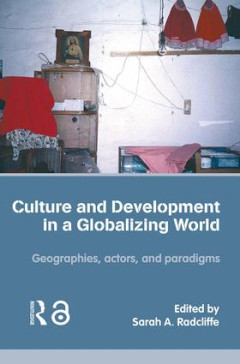
Culture and development in a globalizing world :geographies, actors, and para…
Using recent research on development projects around the world, this book argues that culture has become an explicit tool and framework for development discourse and practice. Providing a theoretical and empirically informed critique, this informative book includes conceptual overviews and case studies on topics such as: development for indigenous people natural resource management …
- Edisi
- -
- ISBN/ISSN
- 9780203641019
- Deskripsi Fisik
- xiv, 280p. : ill.
- Judul Seri
- -
- No. Panggil
- 306.3091724 CUL c
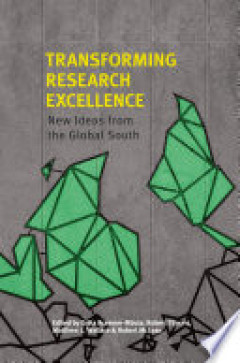
Transforming research excellence:new ideas from the global south
Modern-day science is under great pressure. A potent mix of increasing expectations, limited resources, tensions between competition and cooperation, and the need for evidence-based funding is creating major change in how science is conducted and perceived. Amidst this ‘perfect storm’ is the allure of ‘research excellence’, a concept that drives decisions made by universities and funder…
- Edisi
- -
- ISBN/ISSN
- 9781928502074
- Deskripsi Fisik
- 298 p.; 22 cm.
- Judul Seri
- -
- No. Panggil
- 378 TRA t
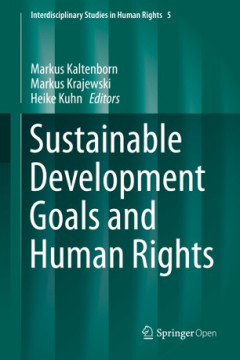
Sustainable development goals and human rights
This open access book analyses the interplay of sustainable development and human rights from different perspectives including fight against poverty, health, gender equality, working conditions, climate change and the role of private actors. Each aspect is addressed from a more human rights-focused angle and a development-policy angle. This allows comparisons between the different approaches bu…
- Edisi
- -
- ISBN/ISSN
- 9783030304690
- Deskripsi Fisik
- xv, 239p. : ill.
- Judul Seri
- -
- No. Panggil
- 304.2 SUS s

Epistemology and transformation of knowledge in global age
This book consists of seven chapters containing multiple questions of the global socially epistemological situation in science and higher education. Despite the progress of techno-sciences, we are facing blind flaws in leading systems of knowledge and perception. The global era, in a paradox way, connects the new knowledge of economics, postpolitics, postdemocracy, and biopolitical regulation o…
- Edisi
- -
- ISBN/ISSN
- 9789535133872
- Deskripsi Fisik
- 148 p.; 22 cm.
- Judul Seri
- -
- No. Panggil
- 100 EPI e
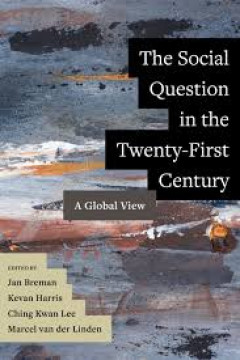
Social question in the twenty-first century:a global view
Want, disease, ignorance, squalor, and idleness: first recognized together in mid-nineteenth-century Europe, these are the focus of the Social Question. In 1942 William Beveridge called them the “giant evils” while diagnosing the crises produced by the emergence of industrial society. More recently, during the final quarter of the twentieth century, the global spread of neoliberal policies …
- Edisi
- -
- ISBN/ISSN
- 9780520302402
- Deskripsi Fisik
- xii, 266 pages : illustrations, maps ; 23 cm
- Judul Seri
- -
- No. Panggil
- 306.3 BRE s

Communicating, Networking :Interacting The International Year of Global Under…
This book illustrates the benefits to be gained from digitally networked communication for health, education and transitioning economies in developing nations (Sierra Leone and Papua New Guinea) and developed nations. Growing powers of e-citizenship can help build sustainable futures. This small volume provides a collection of examples and ideas from which the authors hope will help build a wid…
- Edisi
- -
- ISBN/ISSN
- 9783319454719
- Deskripsi Fisik
- XV, 77 p.
- Judul Seri
- -
- No. Panggil
- 302.23 COM c
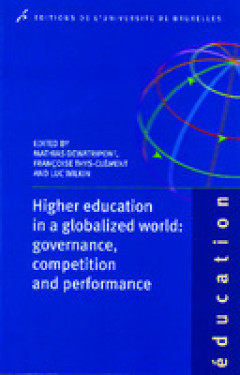
HIgher education in globalized world:governance, competition and performance
This book offers an improved understanding of European higher education, both from a scientific and a policy point of view.
- Edisi
- -
- ISBN/ISSN
- 9782800414225
- Deskripsi Fisik
- 300p.: ill
- Judul Seri
- -
- No. Panggil
- 378.4 LUC h

United Nations peace operations in a changing global order
This open access volume explores how UN peace operations are adapting to four trends in the changing global order: (1) the rebalancing of relations between states of the global North and the global South; (2) the rise of regional organisations as providers of peace; (3) the rise of violent extremism and fundamentalist non-state actors; and (4) increasing demands from non-state actors for greate…
- Edisi
- -
- ISBN/ISSN
- 9783319991061
- Deskripsi Fisik
- xxv, 334p. : ill.
- Judul Seri
- -
- No. Panggil
- 341.584 UNI u
 Karya Umum
Karya Umum  Filsafat
Filsafat  Agama
Agama  Ilmu-ilmu Sosial
Ilmu-ilmu Sosial  Bahasa
Bahasa  Ilmu-ilmu Murni
Ilmu-ilmu Murni  Ilmu-ilmu Terapan
Ilmu-ilmu Terapan  Kesenian, Hiburan, dan Olahraga
Kesenian, Hiburan, dan Olahraga  Kesusastraan
Kesusastraan  Geografi dan Sejarah
Geografi dan Sejarah